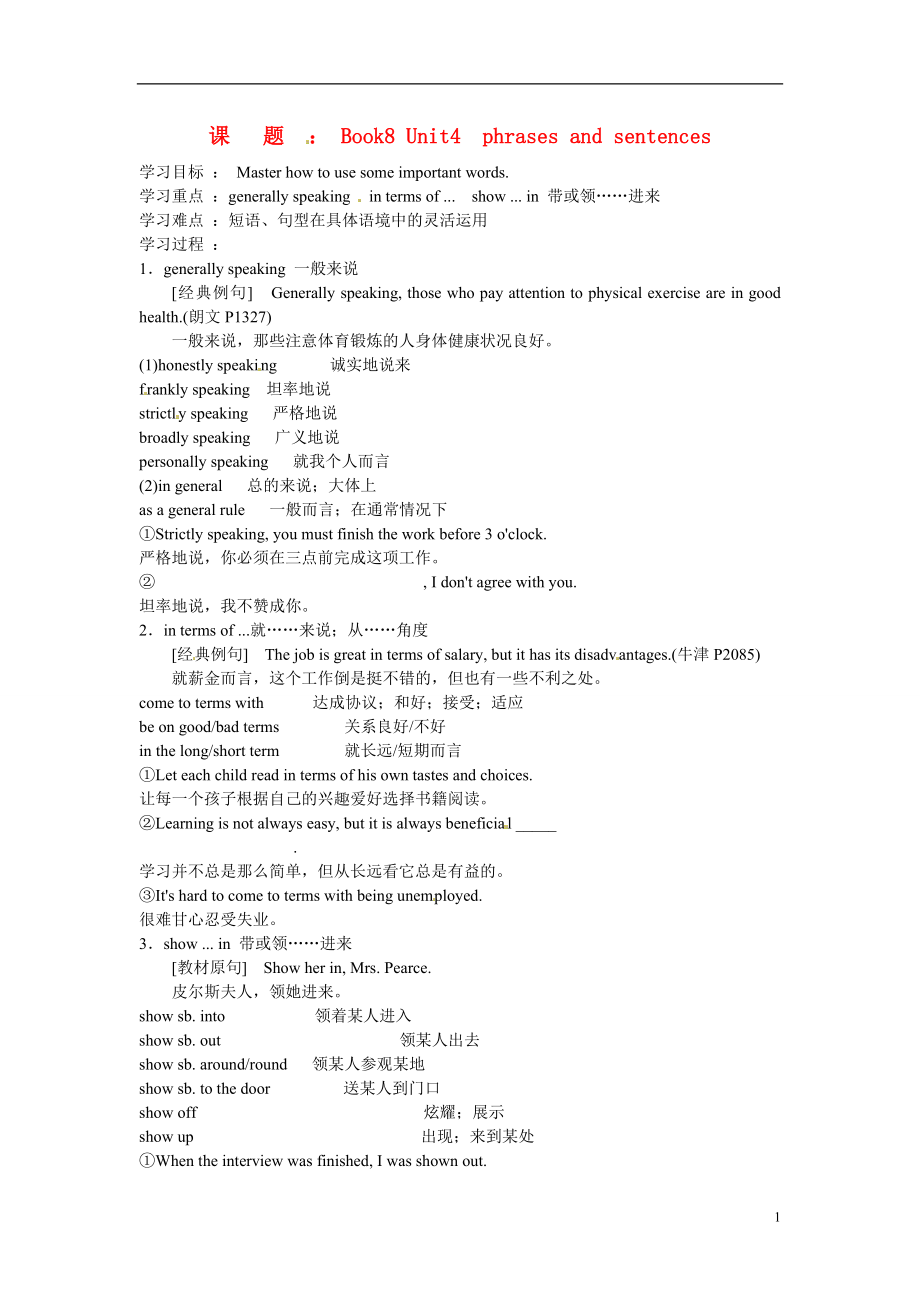《河北省撫寧縣第六中學(xué)2013-2014學(xué)年高二英語 Unit4 Pygmalion學(xué)案2》由會員分享����,可在線閱讀,更多相關(guān)《河北省撫寧縣第六中學(xué)2013-2014學(xué)年高二英語 Unit4 Pygmalion學(xué)案2(2頁珍藏版)》請在裝配圖網(wǎng)上搜索�����。
1�����、
課 題 : Book8 Unit4 phrases and sentences
學(xué)習目標 : Master how to use some important words.
學(xué)習重點 :generally speaking in terms of ... show ... in 帶或領(lǐng)……進來
學(xué)習難點 :短語��、句型在具體語境中的靈活運用
學(xué)習過程 :
1.generally speaking 一般來說
[經(jīng)典例句] Generally speaking, those who pay attention to physical exercise are i
2���、n good health.(朗文P1327)
一般來說�,那些注意體育鍛煉的人身體健康狀況良好���。
(1)honestly speaking 誠實地說來
frankly speaking 坦率地說
strictly speaking 嚴格地說
broadly speaking 廣義地說
personally speaking 就我個人而言
(2)in general 總的來說�����;大體上
as a general rule 一般而言��;在通常情況下
①Strictly speaking, you must finish the work before 3
3�����、 o'clock.
嚴格地說����,你必須在三點前完成這項工作。
② , I don't agree with you.
坦率地說�,我不贊成你。
2.in terms of ...就……來說�����;從……角度
[經(jīng)典例句] The job is great in terms of salary, but it has its disadvantages.(牛津P2085)
就薪金而言����,這個工作倒是挺不錯的��,但也有一些不利之處��。
come to terms with 達成協(xié)議���;和好���;接受��;適應(yīng)
be on good/ba
4��、d terms 關(guān)系良好/不好
in the long/short term 就長遠/短期而言
①Let each child read in terms of his own tastes and choices.
讓每一個孩子根據(jù)自己的興趣愛好選擇書籍閱讀�。
②Learning is not always easy, but it is always beneficial _____
.
學(xué)習并不總是那么簡單����,但從長遠看它總是有益的。
③It's hard to come to terms with bein
5���、g unemployed.
很難甘心忍受失業(yè)����。
3.show ... in 帶或領(lǐng)……進來
[教材原句] Show her in, Mrs. Pearce.
皮爾斯夫人��,領(lǐng)她進來�����。
show sb. into 領(lǐng)著某人進入
show sb. out 領(lǐng)某人出去
show sb. around/round 領(lǐng)某人參觀某地
show sb. to the door 送某人到門口
show off 炫耀����;展示
show up
6����、 出現(xiàn)��;來到某處
①When the interview was finished, I was shown out.
面試結(jié)束后�,我被引導(dǎo)著走出來。
②They their school, their advanced science lab and when all was finished they ________
the school gate.
他們領(lǐng)著我們參觀了他們的學(xué)校���,展示了他們先進的科學(xué)實驗室���,所有
7、的參觀任務(wù)完成后他們把我們送到學(xué)校大門口�����。
[短語對點集訓(xùn)]
Ⅰ.完成句子
1. (就質(zhì)量和數(shù)量而言), the clothes factory in our town is doing much better than last year.
2.As the program ended, the music slowly (漸弱) and someone began to speak.
3. (一般而言), prices follow demand; if there is no demand, prices are low.
4.When he didn't know how to get out of the building, a boy
(把他送出去).
2
 河北省撫寧縣第六中學(xué)2013-2014學(xué)年高二英語 Unit4 Pygmalion學(xué)案2
河北省撫寧縣第六中學(xué)2013-2014學(xué)年高二英語 Unit4 Pygmalion學(xué)案2

